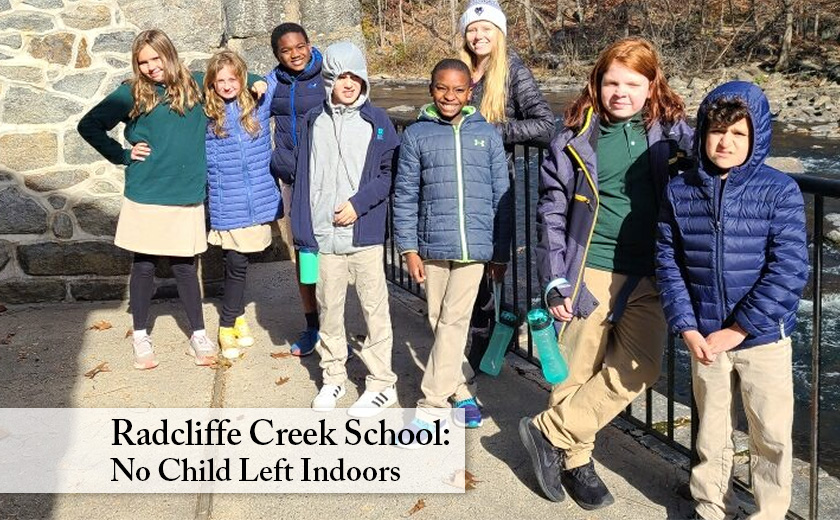One critical lesson from the pandemic’s dire years of isolating and monotonous shutdowns was the positive mental health results of reconnecting to the natural world beyond cell phones and computer screens.
This did not go unnoticed by educators, who are already aware of social media’s addictive nature and seeing it compounded by the pandemic. According to Annie E. Casey Foundation research, 95% of teens 13-17 use social media, with 1 in 3 reporting “almost constantly.”
Noticing these trends, Radcliffe Creek School in Chestertown, known for its commitment to environmental education and working with students from kindergarten through 8th grade who have been diagnosed with learning differences, such as dyslexia, ADHD, and other language-based learning difficulties, has announced the launch of a new outdoor education project titled “No Child Left Indoors.”
Inspired by Richard Louv’s concept of nature-deficit disorder, the “No Child Left Indoors” project aims to ensure every child has meaningful experiences in nature each year. Louv’s book The Last Child in the Woods points out that today’s digital native generation lacks exposure to nature, which he calls “nature-deficit disorder.” He advocates that direct exposure to nature is crucial for healthy childhood development and for the physical and emotional well-being of both children and adults.
“Our purpose is to ensure that every child has a series of meaningful experiences in nature each year at RCS that will help them be better citizens in their communities and better stewards of their environment,” says Head of School Peter Thayer.
With a generous grant from the Robert F. Schumann Foundation, the project aligns with the Foundation’s mission to improve the planet through environmental education. Radcliffe Creek School has a long-standing commitment to educating children about nature and the importance of environmental stewardship.
To implement the project, Radcliffe Creek School has designated Outdoor Education Coordinators for different grade levels. These coordinators work with teachers to plan educational field trips that tie directly to the academic experience. They also ensure that every excursion is safe, engaging, and educational.
Students are encouraged to reflect on their experiences in nature and document them in their Nature Portfolio. This work is cross-curricular, engaging students’ skills in reading, writing, math, science, and social studies.
The spy recently interviewed Head of School Peter Thayer, Discovery Department Head Simone Vagnoni, and Discovery Teacher Amanda Stubbs.
This video is approximately thirteen minutes in length. For more about Radcliffe Creek School, go here.


Write a Letter to the Editor on this Article
We encourage readers to offer their point of view on this article by submitting the following form. Editing is sometimes necessary and is done at the discretion of the editorial staff.